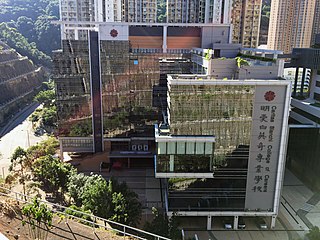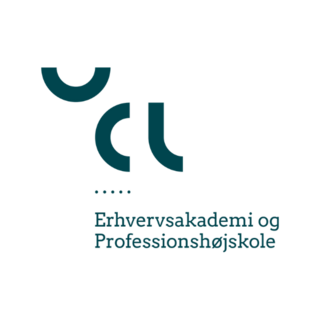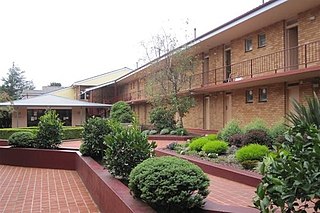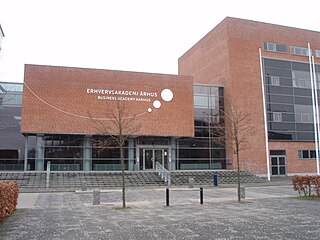Higher education in Denmark is offered by a range of universities, university colleges, business academies and specialised institutions. The national higher education system is in accordance with the Bologna Process, with bachelor's degrees, master's degrees and doctoral degrees. The majority of higher education institutions are the responsibility of the Ministry of Higher Education and Science; however, some higher education institutions within the arts are the responsibility of the Ministry of Culture.
Education in Denmark is compulsory for children below the age of 15 or 16, even though it is not compulsory to attend Folkeskole. The school years up to the age of fifteen/sixteen are known as Folkeskole, since any education has to match the level offered there. About 82% of young people take further education in addition to this. Government-funded education is usually free of charge and open to all. Denmark has a tradition of private schools and about 15.6% of all children at basic school level attend private schools, which are supported by a voucher system.

Sri Lanka Institute of Information Technology is a private university located in Malabe and Colombo, Sri Lanka. It specialises in various fields like technology and management.

Leading University, commonly known as LU, is a private university of Bangladesh. It was founded in 2001. The LU campus is located in Ragib Nagar, Kamal Bazar, South Surma, Sylhet.

Caritas Bianchi College of Careers (CBCC) was established in 1971 and has been providing post-secondary education since then. At present, it mainly offers sub-degree programmes in three general disciplines: business and hospitality management, design and health sciences. It is located at Tiu Keng Leng, Tseung Kwan O, near Tiu Keng Leng station.

The International College of Management, Sydney (ICMS) is a higher education provider offering degrees at the diploma level and above. ICMS offers English, Foundation, Diploma, Bachelor, Graduate Certificate and Master's degree programs in Business, Hospitality and Information Technology. They include:
VIA University College is a university college organisation in Central Denmark Region, Denmark, established in January 2008. It is present in the region with a total of eight campuses.

University College of Northern Denmark were formed under the Danish act on university colleges for higher education, which was adopted by the Danish parliament in 2007. Today, the sector is composed of six university colleges.

UCL University College is one of the six regional university colleges in Denmark offering Bachelor courses in the southwest part of Denmark.

The Metropolitan University College, also referred to as Metropolitan UC or MUC, is a university college offering a range of bachelor's degree and academy profession degree programmes in Copenhagen, Denmark. All programmes are taught in Danish except for a bachelor's degree in Global Nutrition and Health. A range of courses and modules in English are available to exchange students.

The Blue Mountains International Hotel Management School (BMIHMS) is an Australian hotel management training school affiliated with the private, for-profit Torrens University Australia. The school maintains campuses in Leura, Melbourne, Sydney, and Adelaide of Australia, as well as an overseas campus in Suzhou, China.

ESOFT Metro Campus is a private sector educational institute or college located in Colombo, Sri Lanka. It offers academic and professional qualifications in Computing, Business & Management, Engineering, Hospitality and English. Established in the year 2000, the company today has 40 branches nationwide. It is headed by Dr. Dayan Rajapakse.
Victoria University Uganda (VUU), also known as Victoria University Kampala, is a university in Uganda, accredited by the Uganda National Council for Higher Education (UNCHE). It offers short, professional, diploma, undergraduate and postgraduate courses.

Excelia is a French private university-level institution of higher education. Created in 1988 as Groupe Sup de Co La Rochelle, it is a non-profit organisation linked to the La Rochelle Chamber of Commerce and Industry (CCI) and a member of the Conférence des Grandes Écoles. Excelia Group's Business School belongs to the approximately 100 business schools worldwide holding a triple accreditation.

International University of East Africa (IUEA) is a private non-profit institution in Uganda, and is a chartered University by the Uganda National Council for Higher Education (NCHE).
Academic ranks in Denmark are the positions and titles of professors, researchers, and administrative personnel held in academia at Danish institutions, and the relations between them.

Business Academy Aarhus is a school of higher education in Aarhus, Denmark founded on 1 January 2009. The academy is an independent self-owning institution subordinated to the Ministry of Science, Innovation and Higher Education. Degree programmes offered are mainly applied degrees, especially in technology, IT and business. The academy grants undergraduate and academic degrees but not master's or doctoral degrees. In addition to full-time studies the academy offers supplemental education, part-time programmes at bachelor's level and short-term courses for people who need to strengthen their qualifications. The academy is one of the largest business academies in Denmark.
Copenhagen Business Academy, also known as Cphbusiness, is a school of higher education in Copenhagen, Denmark. The academy is an independent self-owning institution subordinated to the Ministry of Science, Innovation and Higher Education. Degree programmes offered are mainly applied degrees, especially in business, finance, service management, IT and biotechnical science. The academy grants undergraduate and academic degrees but not master's or doctoral degrees. In addition to full-time studies the academy offers supplemental education, part-time programmes at bachelor's level and short-term courses for people who need to strengthen their qualifications. The academy is one of the largest business academies in Denmark. The academy has 4.800 full-time students and 5.800 part-time students and about 350 employees.
KEA – Copenhagen School of Design and Technology, is a school of higher education in Copenhagen, Denmark. The academy is an independent self-owning institution subordinated to the Ministry of Science, Innovation and Higher Education. Degree programmes offered are mainly applied degrees, especially in design, technology and IT. The academy grants undergraduate and Professional degrees and has no graduate school. In addition to full-time studies the academy offers supplemental education, part-time programmes at bachelor's level and short-term courses for people who need to strengthen their qualifications. With 4,717 full-time students and 3,907 part-time students and about 350 employees as of 2015, the academy is one of the largest business academies in Denmark.
Zealand Institute of Technologies and Business or Zealand is a school of higher education established in 2008 due to a merger of nine Danish Colleges, most dating back more than 100 years. It is regularly ranked within the top 4 business academies in Denmark and is currently ranked first in the Køge Municipality. Zealand operates six campuses in Region Zealand to the west and south of Copenhagen, Denmark. The campuses, with a total of some 3,200 students, are located in Næstved, Roskilde, Køge, Slagelse, Holbæk and Nykøbing Falster. The school is an independent self-owning institution subordinated to the Ministry of Science, Innovation and Higher Education. Degree programs offered are mainly applied degrees, especially in technology, IT, and business. The academy grants undergraduate and academic degrees but not master's or doctoral degrees. In addition to full-time studies, the academy offers supplemental education, part-time programs at bachelor's level, and short-term courses for people who need to strengthen their qualifications.











